Are you coming to Argentina and planning on getting around on your high school Spanish and Duolingo streak alone?
I have bad news for you.
Rioplatense Spanish – the Spanish spoken in Buenos Aires and surrounding areas – is unlike anything you were taught in high school.
Even if you consider yourself a strong Spanish speaker you are in for a whirlwind of new Spanish vocabulary here.
Before coming to Argentina, I first learned Spanish in Texas from Mexican professors. Then I went to Spain and picked up yet another new accent. Finally, I settled in Argentina. It was a challenge.
But after 15 years of living in Buenos Aires I now use che and boludo without an ounce of irony, like a true Porteño.
I’ve worked hard on this post to help you learn to navigate Argentine slang like a local.
Even if you don’t come out of Argentina speaking like a gaucho, I do hope you leave with a greater appreciation for this country’s language and history.
The country’s history – from waves of immigration to the rise of tango – had a massive impact on its language. To learn about lunfardo is to gain perspective into Argentina’s colorful history.
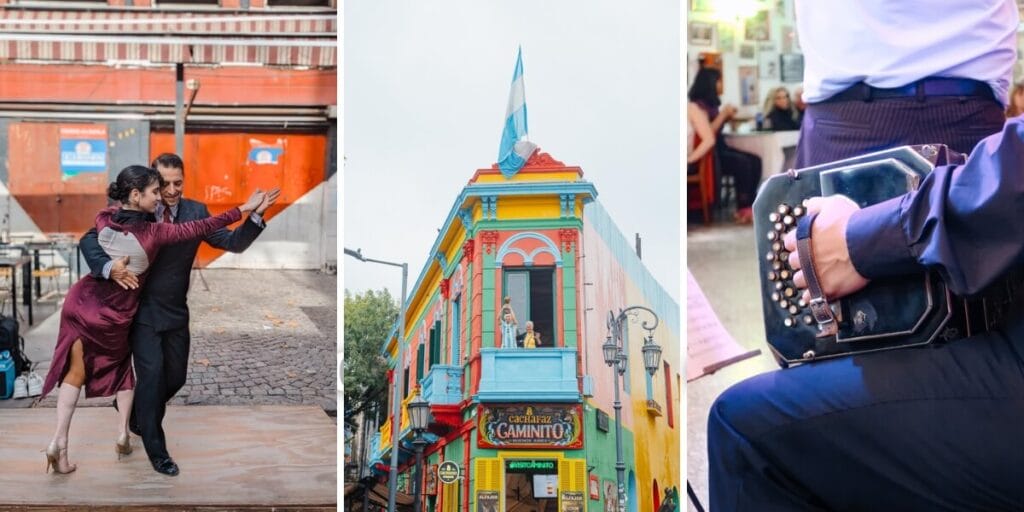
QUICK NOTE: This post contains affiliate links and Sol Salute may receive a commission for purchases made through these links, at no extra cost to you.
A Beginner’s Guide to Argentinian Slang
Every country has its slang – informal speech that eventually creeps into everyday conversation.
Often, some slang words even find themselves in dictionaries and formal conversation. It begins to form part of the fabric of society and its official language.
Argentinian slang is referred to as lunfardo and many lunfardo words are used in everyday conversation.
But what makes Argentine Spanish truly unique goes beyond just slang.
With the use of vos instead of tú and the pronunciation of “ll” and “y”, the entire language feels different if you learned Spanish elsewhere.
There are two great differences in Argentinian Spanish: el voseo and el yeísmo. Vesre is another facet of lunfardo that deserves its own explanation apart from the vocabulary list to follow.
With this foundation set, we can later dive into Lunfardo’s origins and specific slang words.

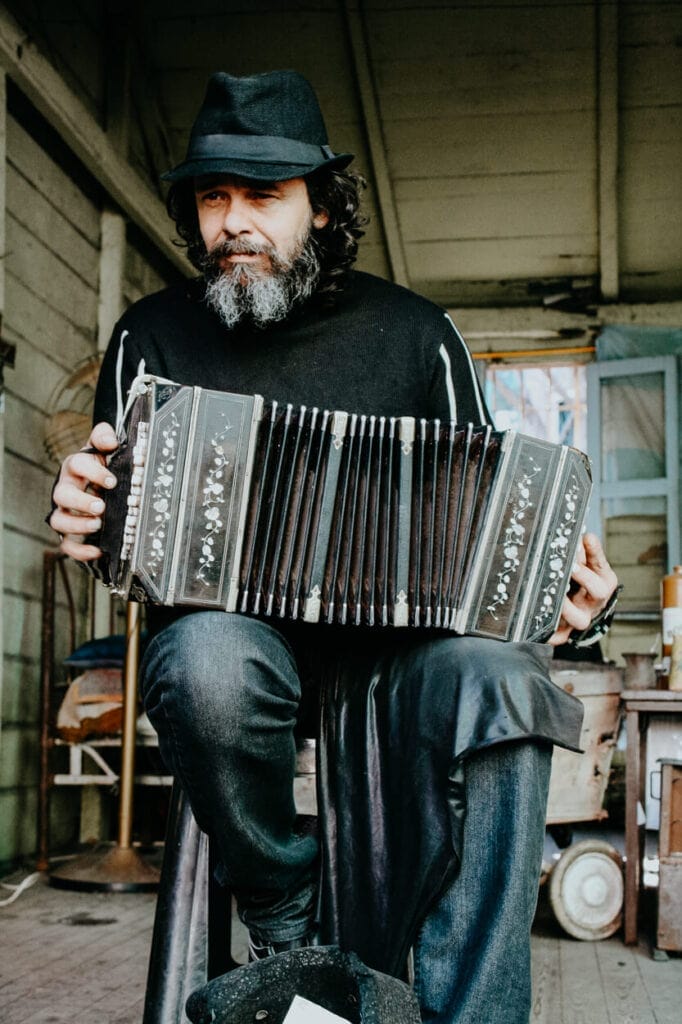
El Voseo
In Buenos Aires and surrounding areas (including parts of Uruguay) you’ll hear vos instead of tú for familiar form of address – the familiar you.
Do you want (tú quieres) in Buenos Aires becomes vos querés.
Did you notice that the irregular conjugation is thrown out the window there? Tú tienes becomes, you guessed it, vos tenés.
El Yeísmo
Instead of the typical Y sound, the “y” and “ll” sounds in Buenos Aires are pronounced as sh.
For example, instead of po-yo, pollo is pronounced posho.
Llueve (it rains) is pronounced shueve instead of yueve.
Vesre
Vesre is a playful part of lunfardo, involving the swapping the syllables of words.
And to hammer the point home, vesre IS vesre, coming from revés (Spanish for backwards).
Usually, but not always (that would be too easy), vesre involves bringing the final syllable to the front.
For example, la calle becomes la lleca.
There are some irregular “vesreísmos” that I have been unable to find any rhyme or reason to, such as pantalón becoming lompa.
If you pay attention to the way people speak you’ll hear vesre all the time.
Feca (from cafe) and Garpar (from pagar) are two vesre terms that have become part of everyday conversation.

The History of Lunfardo & Argentine Slang
Lunfardo is the slang spoken in Buenos Aires and surrounding areas, including Uruguay.
It originated from the large influx of immigrants that flowed into the Buenos Aires ports in the mid-19th century through the start of the 20th century.
Italian, Galician, and French (among others) blended with the multitude of languages already here.
Palabras gauchescas (words used by gauchos), indigenous languages such as guaraní and African languages via the slave trade all awaited these European immigrants.
A pidgin language started to take form, referred to as cocoliche, a hodgepodge of the many Italian dialects and Spanish.
Over time, cocoliche began to fade but a lot of the words were absorbed into Lunfardo and are still used today.

The name Lunfardo itself comes from Lombardo, referring to Lombardy in Northern Italy. The Lombardos were the first bankers and therefore the first loan sharks of Europe.
And since throughout the history of banks no one has ever liked banks, the word Lombardo was associated with thieves or conmen.
In 19th century Rome, Lombardo was synonymous with thief.
It’s only natural that the word would travel to Argentina with the large wave of immigration from Italy.
Furthering its connection to criminals, it’s said that prisoners used lunfardo so guards wouldn’t understand what they were saying.
Oscar Conde explains the importance of Lunfardo in this interview.
He describes lunfardo as a language of the people and the vocabulary covers every aspect of life.
Lunfardo was originally spoken among immigrants, the working class, and criminals. Today, it is part of everyday conversation, a reflection of Argentina’s diverse and rich history.
Resources for Learning Argentine Spanish
- Che, Boludo – The book to get if you want a complete dictionary for Argentine Slang
- Spanish Crash Course – In Argentina with limited time? This one day crash course will give you the basics you need for your trip, a truly fun way to learn the basics with a small group in person.
- In Person Classes – This week-long pack of classes is a great option to get started learning Spanish in Buenos Aires.
- Learn Online – Want to brush up on your Spanish before you arrive? Take lessons online with local teachers, it will make a difference to have practiced Argentine Spanish in particular.
35+ Argentine Slang Words
Here are 30+ Argentine slang words to help you navigate lunfardo like a Porteño.
Each word or phrase has a detailed explanation including possible variations and examples to give you the tools to speak like a local in Buenos Aires.
These are the words and phrases Google Translate won’t teach you.
Che
Che, thanks to Che Guevara, might be the most internationally known Argentinian slang word.
Yet it isn’t a name, it is a call for attention. “Che, ¿que hacés?” – “Hey, what are you doing?”
Che also means man or dude. Che, ¿cómo estás? – “How are you, man?”
It can also be used as an expression of surprise or for emphasis. “Wow, that’s amazing!” becomes “Che! Increíble!”
And when you’re looking for something to replace your ums, use che as your filler. “Y bueno, che, que hacemos ahora?” – “And, well, che, what should we do now?”
With all these ways to infuse che into your daily vocabulary, it’s easy to see how Ernesto “Che” Guevara earned his nickname.
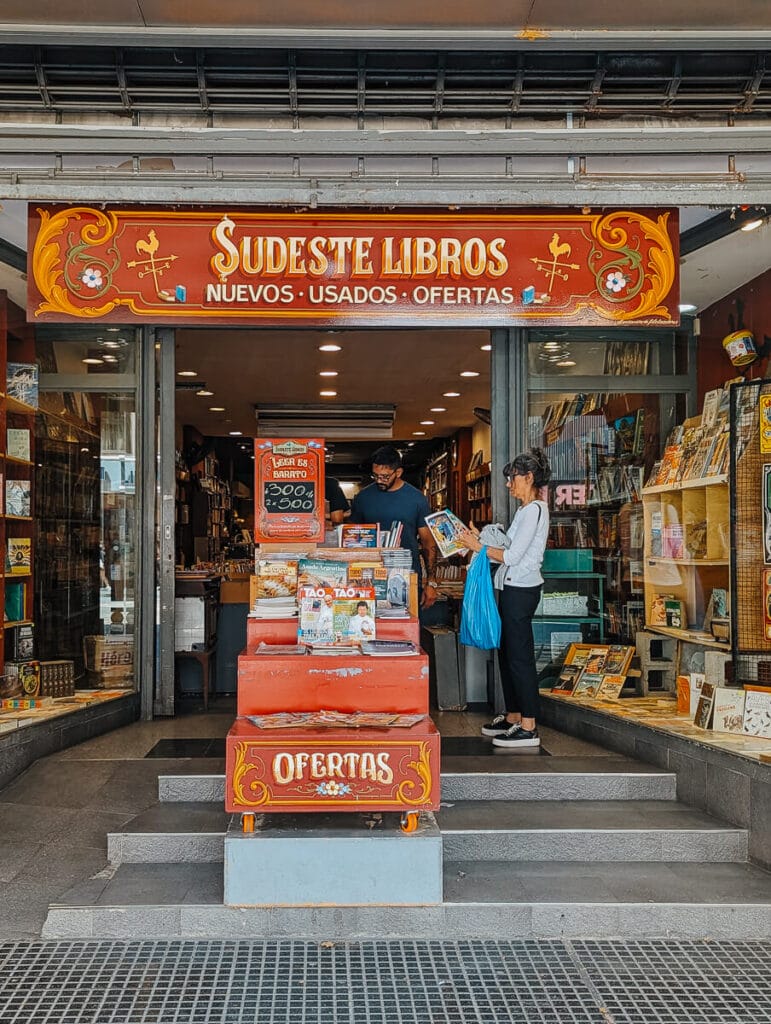
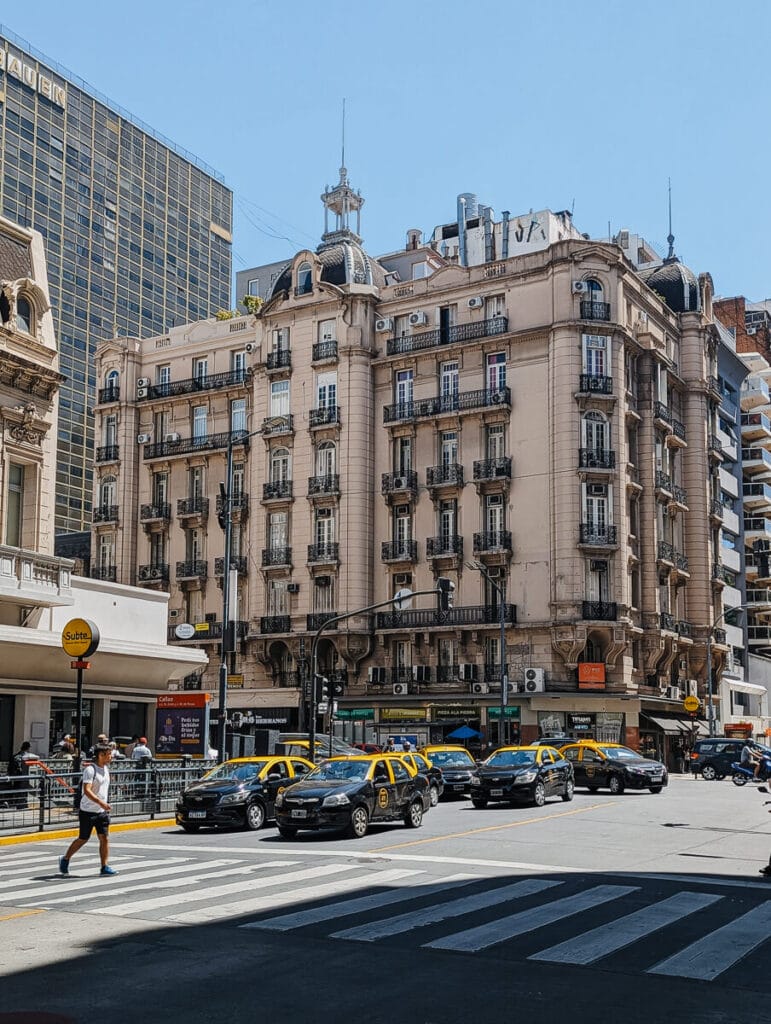
Boludo
Easily one of the most common words in Argentinian slang – Boludo is a mild insult turned term of endearment.
Strictly speaking, it translates to idiot or fool, similar to Mexico’s pendejo. (Unrelated but interesting fact, pendejo in Argentina means child, proof that Spanish differs wildly between countries).
While you’ll definitely hear boludo in the streets as an insult, it isn’t a strong one. Imagine shaking your head at someone’s mistake as you mutter “boludo”.
Its use as a term of endearment is much more common: boludo among the guys, boluda among the ladies.
Che, boludo! is a lunfardo phrase translating to “hey dude” and you will hear it all the time.
And it doesn’t stop there. Boludo becomes a verb with “boludear” to mean messing around. Estoy boludeando is an easy way to say you’re just wasting time, messing around.
And yet another form of boludo is “boludez” or “boludeces”, meaning an easy task or worthless item.
You could downplay how hard a task is as you give instructions, “it’s not very hard, don’t worry, es un boludez,” or to describe someone’s actions as irresponsible or stupid, “están haciendo boludeces.”
Pelotudo
Boludo can play nice but pelotudo means business. This is one of the most common words in Argentine slang and it’s a strong insult.
Pelotudo loosely translates to asshole, jerk, or as used in Spain – gilipollas. It means idiot but it’s vulgar. As a foreigner, you can probably get away with using boludo but I would avoid testing out pelotudo.
It may mean the same as boludo but it is far more insulting and carries much more weight. If (read: when) you hear it in the streets it will be shouted in anger.
Of course, pelotudo also can be used as a term of endearment but only with someone you have a certain level of confidence with. Similar to how I call my life-long best friend bitch, I wouldn’t call just anyone pelotuda.
Re
Some may say there’s nothing more purely part of Argentina slang than boludo or che, but I have to say “re” takes the cake.
Re is used as an intensifier. If something is good it’s “bueno,” if it’s really good, it’s “re-bueno.”
It can be an intensifier for adjectives (“re lindo” means super cute) and verbs (“re cansa” means it’s really tiring).
It’s gotten to be so ubiquitous that you can even use it as a standalone response.
- Era linda la mina? (Was the girl pretty?) – Re! (Very!)
And it doesn’t stop there. If “re” isn’t enough to express how strongly you feel about something then you can up the ante with the addition of contra:
- Re – very. it’s SO good, it’s re bueno
- Recontra – is it VERY VERY good? It’s recontra bueno.
- Requetecontra – Can you not even find the words to express HOW good it is? Is it the fucking best? It’s re que te re contra bueno.
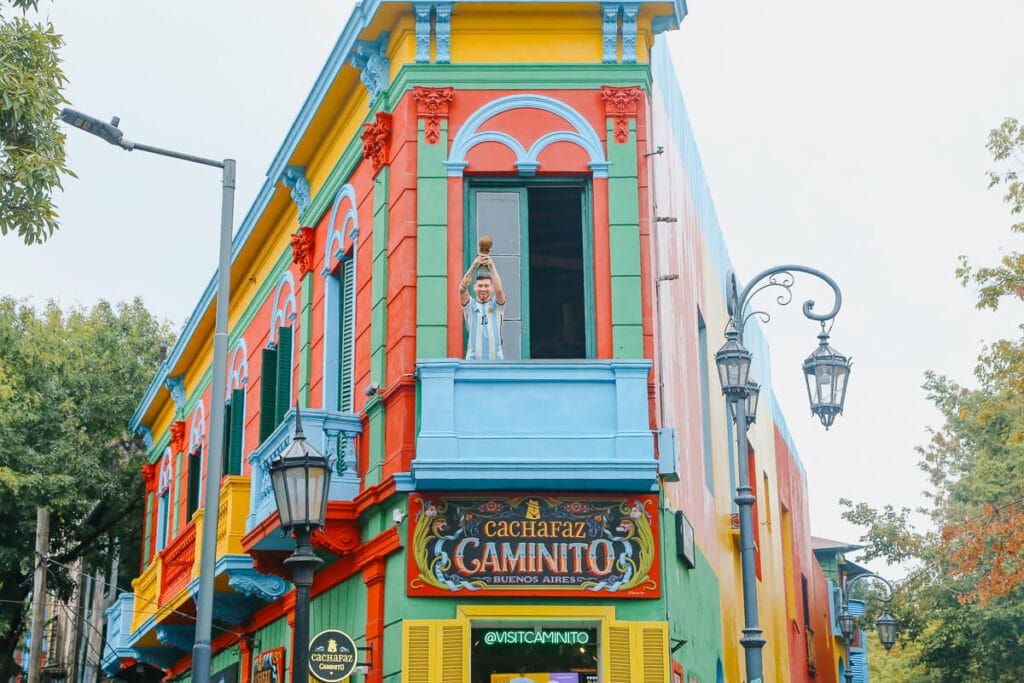
Onda
Literally, it means wave – the kind in the ocean and the kind in your hair. Figuratively, it’s one of the most used words in Argentinian slang loosely translating to vibes.
Good vibes, bad vibes, style, attitude – all of this is encompassed with “onda.”
Es buena onda is a way of complimenting a person’s entire vibe and personality. They’re a good person, I like their vibe.
Another common use of onda is to ask what’s up.
- “¿Che, qué onda? – What’s up, man?
- “¿Qué onda con este lugar? – What’s going on with this place? So you can phrase it not only to ask what’s up but to figure out what’s going on with a certain place or situation.
You can also “tirar onda” to flirt with someone. It’s not just a pick up line, it’s giving off a certain kind of energy.
- “Me está tirando onda?” means “Is he hitting on me?”
- “Me encanta la onda que tirás, siempre tan positiva.” – It doesn’t have to always be flirtatious, here it means “I love the energy you give off, it’s always so positive”
Posta
Like many words you’ll see in this list, posta was borrowed from Italian. The Italian word “apposta” (properly) has become the Argentine “posta.”
Posta is the Argentinian slang equivalent of “no, really.” It’s typically added on at the end of a phrase for emphasis.
- “This is the best restaurant, seriously.” – “Es el mejor restaurante, posta.”
It can also be used as a response in the form of a question to confirm if something is true. Someone told you that is the best restaurant. You can respond with “posta?” – “seriously/is it really?”
And to “tirar la posta” is to dish, give the tea or spill the beans.
Garca
Garca is an Argentine slang word taken from vesre.
Cagar is vulgar, meaning “to shit” but is often used in the way of “to screw someone over.”
Cagar is swapped to become garca.
And a garca is someone who is a jerk or someone deceitful and untrustworthy. It’s derogatory.
I’ve seen some articles attribute garca’s origins to garcón, French for boy. But to me, vesre is the only clear explanation for garca. Whatever the origins, you’re sure to hear it once or twice while in Argentina.
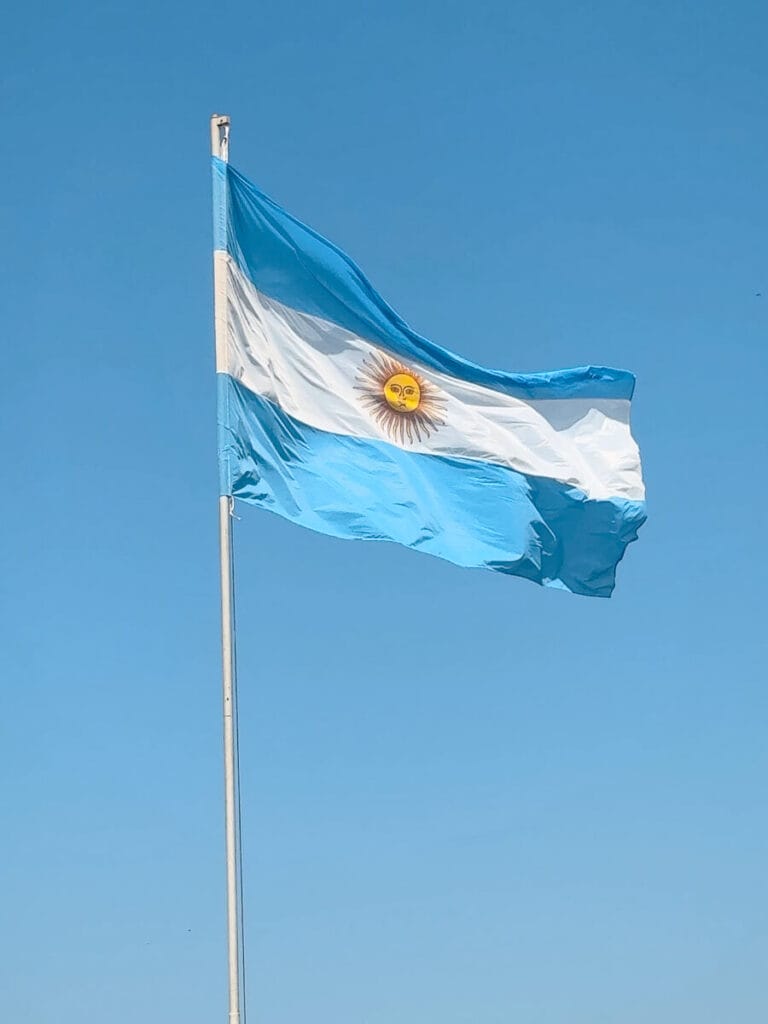

Quilombo
Quilombo is a slang word in Argentina used to describe chaos.
- “Que quilombo esto!” – “What a disaster/chaos!”
- “Es un quilombo ahi afuera.” – “It’s a mess out there.”
Quilombo is a word taken from African slaves via Brazil. In Brazil, communities of escaped slaves were called “quilombos.” These communities were lawless by nature, turbulent and chaotic.
The word quilombo began to form part of Brazilian slang to describe moments and situations of disorder. Today it’s used in Argentina and Uruguay to describe chaotic situations.
Pedo
One word, one simple word – fart – has a multitude of uses in Argentina.
So, yes, simply put, pedo means fart. But depending on the use it could mean any of the following:
- Estar en pedo – To be drunk.
- Estar al pedo – To be useless or not doing anything. I’m not doing anything – Estoy al pedo.
- Ni en pedo – No way, not a chance, forget about it.
- De pedo – By chance, Llegué de pedo.” means “I made it just in time” or “I barely made it.”
And this is really just scratching the surface of pedo, to give you the four most common uses. It’s highly likely you hear one or a few of these while you’re in Argentina.
Pibe
Pibe is the Argentinian slang word for a young boy. Piba is the word for girl. You will hear this much more often than chico/a and muchacho/a.
It can also be used among friends or as a term of familiarity. I’ve definitely heard my husband refer to his friends as los pibes.
Another word for kid in Argentina that will take you by surprise if you first learned Spanish in Mexico – pendejo. The first time I heard this used casually I couldn’t believe anyone would talk about children in such a way, when in fact, pendejo is just another word for pibe.
- “Hacerse el pendejo” even means to “act innocent.”
- “De pendejo siempre me metía en problemas.” means “As a kid, I always got into trouble.”
Chabón
Similar to dude or guy in English, chabón or chabona, is an informal way to refer to someone.
- “¡Che, chabón, vení!” – “Hey, dude, come here!”
- “Ese chabón es muy simpático.” – “That guy is really nice.”
Chabona is the feminine version but this particular word is definitely more common among the guys.

Mina
Mina is widely used in Argentina slang to refer to women. The tone and meaning will depend heavily on the context.
It’s always casual but can be insulting or benign.
- “Conocí a una mina en la fiesta.” – “I met a girl at the party.”
- I’ve also heard it used to describe something as girly (de mina) versus masculine (de macho). My husband jokingly refers to wheat bread as “pan de mina” and white bread as “pan de macho.”
The origins of mina are murky. It likely comes from the Italian word for woman – femmina – or the Galician menina. Both immigrant groups had a large influence on Lunfardo and Buenos Aires as a whole.
Another possible and more colorful explanation attributes mina to pimps viewing women’s bodies as mines (minas) they could exploit. I lean towards “femmina” as the official source but in the world of tango, who can complain about a little flair.
Coso
Did a certain word slip your mind? Coso is here to save the day.
The closest equivalents would be thingamabob or whatchamacallit or thingamajig in English, basically “I don’t know how to say this.”
Coso is always casual, used mostly among family and friends. It keeps the conversation flowing without searching for the word, no time wasted.
- “Pasame el coso ese para atornillar este tornillo.” – “Pass me that whatchamacallit to screw this screw in.”
My brother in law is infamous for his use of coso. He can bring up a conversation from days ago with zero context. “El coso de ese dia del coso.” The thing from that day with the thing.
Piola
Piola is the Argentine slang word for nice or friendly. It’s casual and informal.
- “Es una chica re piola.” – “She’s a really nice girl.”
It can also be used to describe someone as clever and quick witted.
Our nanny uses piola to describe my daughter all the time. And while yes, my toddler is nice, she’s mostly clever and knows how to get what she wants (in terms of chocolate, candy, and favors). “Es muy piola”, one could say.
Tipo
Tipo is one of my favorite words in slang in Argentina. It has so many uses. It’s my favorite filler word.
The official translation is type. Type of music translates to tipo de música. But in reality, it is used in a multitude of ways.
It’s most often used in place of someone’s name (usually a male), like “that guy.”
- “Ese tipo es muy simpático.” – “That guy is really nice.”
My favorite use of tipo is a filler word like “like” or “around.” It’s often used when guessing or approximating time, age, or a situation.
- “Era tipo las seis cuando llegué.” – “It was like six when I arrived.”
- “La fiesta arranca tipo las ocho.” – “The party starts at around eight.”
Mira Vos
Mira vos is the Argentinian slang version of “check you out” or “well, won’t you look at that.” It’s an expression of disbelief or awe.
I’ve heard it used directly at someone, as if in response to their accomplishment “mira vos!” – “look at you!” as a casual congratulations.
But it doesn’t necessarily need to be in response to “you”, the vos. It can simply be used in place of “wow.”
- “¿Sabías que Juan va a vivir en el extranjero? – ¡Mira vos!” – Did you know that Juan was going to live abroad? – Wow!
It can be congratulatory, sarcastic, used for emphasis, or simply used for filler. Your tone and the context will determine the meaning of your mira vos.

Dar Bola
In Argentine slang, dar bola is a very common phrase for “to pay attention to” someone.
- “Dame bola” – “Pay attention to me.”
- “No me da bola el pibe.” – That guy doesn’t pay any attention to me.
It can also be used to tell someone not to listen to something.
- Don’t let it bother you – “No le des bola.”
Similarly, with added strength, you could use the word pelota.
- “No le des ni pelota.” – Ignore it, it isn’t worth your time.
I always assumed “dar bola” came from Argentina’s love of football (a version of pass me the ball?). But no, dar bola is most likely a gift from the gauchos. Bolas were a hunting weapon, and to dar bola is to actively focus on someone, to hone in on the target, if you will.
Hincha Pelota
Dar bola is to pay attention, so hincha pelota must be similar, no?
Not exactly.
While balls are still involved, to be an hincha pelota is negative.
It translates more like “busting your balls” and means someone is being annoying.
You can use it in a variety of entertaining ways:
- Hincha pelota – A pain in the neck, a ball buster
- “¡No me hinches las pelotas!” – Don’t bother me!
- “Dejá de hinchar las pelotas.” – Stop being such a pain!
- Es un hincha pelotas – He’s such a pain in the ass.
Cheto
Cheto is the Argentine slang word for posh or snob. It’s largely to do with wealth and class.
Similar words across the globe are “fresa” in Mexico or “pijo” in Spain.
It’s often used with disdain or as a critique, as if to describe someone who thinks they’re better than others.
Capo
This piece of lunfardo was pulled straight from the vocabulary of the 20th century wave of Italian immigrants. In Italian, capo means “head” or “chief” and is commonly used in regions like Genoa, where most immigrants to Argentina originated from.
In Argentina, the meaning hasn’t varied much from the original. You can call someone a capo if they’re great at what they do or as a compliment.
- “Mi primo es un capo en matemáticas.” – My cousin is a genius in mathematics.
- “Es el capo del barrio.” – He’s the leader of the neighborhood.
- “¡Qué capo, siempre tenés una buena idea!” -“What a genius, you’re always coming up with great ideas!”
Un capo total, my toddler has heard my husband describe him as that so often he now self-identifies as a “capo total.”
And what’s better than a capo? A capo total. At least that’s what my 4 year old (rightly) believes.

Guita
Money in Argentina is always a hot topic, so it shouldn’t be surprising that there are so many Argentine slang words dedicated to the issue.
Guita is a casual, informal word for money.
- No hay guita, che – There’s no money, man.
From here, it gets even more fun. Mango literally means a peso.
- “No tengo ni un mango” – I don’t have even one peso.
- “Sale 100 mangos el coso!” – The thing costs 100 pesos!
To keep counting, a luca is 1,000 pesos. To complain that something costs 10,000 pesos now you can complain by exclaiming “cuesta 10 lucas!”
And with inflation as rampant as it is, there is obviously a slang word for a million pesos – un palo. And you know they love dollars so a palo verde is a million dollars.
Have a cheap friend? One that has plenty of money but won’t spend even a single mango? In Argentina, you can call him “una rata”, the Argentine slang word for cheapskate.
Morfar
Morfar is Argentine slang for to eat, originating from the Italian word for mouth – morfa.
Consequentially, morfi means food or meal.
“Que buena morfi anoche, che” would mean, the food was so good last night!
Trucho
To say something is trucho in lunfardo is to say it is sketchy or fake.
You can use it to describe counterfeit bills (billetes truchos) or fake designer bags on the sidewalk. Don’t buy them, son truchas.
As a noun, you can describe something as a truchada.
- “Me dijeron que la oferta era buenísima, pero resultó ser una truchada.” – “They told me the offer was great, but it turned out to be a scam.”
Similarly, choto is another slang word for poor quality but more vulgar than trucho. It’s a more crude way to describe something as rubbish or a piece of junk.
Zarpado
If something is extremely good or impressive, in Argentine slang it is zarpado.
“¡Qué zarpado!” – So cool!
As a verb, it can be used to tell someone they have outdone themselves.
- La fiesta estuvo zarpada, no paré de bailar.” – The party was incredible, I couldn’t stop dancing.
A similar word with the same meaning is copado. If something or someone is really cool, they are copado.
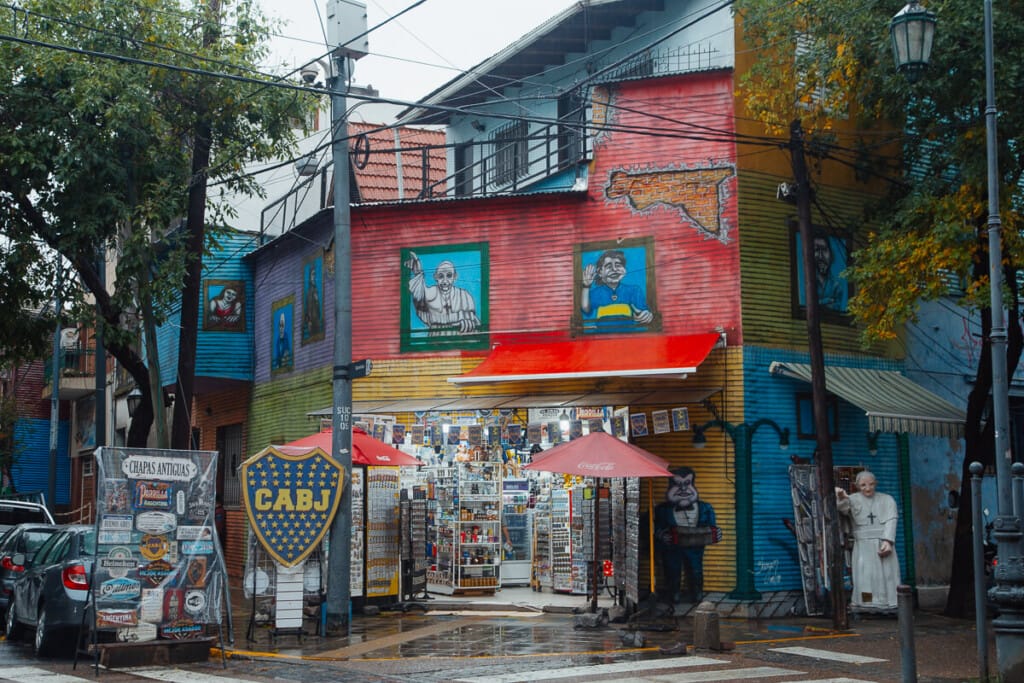
¡Qué bajón!
¡Qué bajón! is the Argentine way of exclaiming – What a bummer!
Bajón literally translates to “a drop” so it makes sense in this use as a “letdown”.
It can be used in a number of ways. For example, estar bajoneado/a is a way of saying to be depressed or feeling down.
Chamuyar
Chamuyar is a popular Argentina slang word for to charm or to flirt with someone but usually with a tone of dishonesty or slickness.
If someone is a charmer and a smooth talker, a real Don Juan, then they’re a chamuyero. Chamuyo is the charm they sell.
To chamuyar is a form of exaggerated flattery. It’s trying to win someone over.
To chamuyar is more than “tirar onda.” To tirar onda is to send out a vibe, to send a signal you’re interested. A chamuyero, in contrast, is actively charming you and trying to win you over.
If you go to a boliche (lunfardo for dance club) then you’ll surely meet a chamuyero (or four or five).
Boliche
Boliche is the Argentinian slang word for disco or nightclub.
- “¿A qué boliche vamos esta noche?” – What club are we going to tonight?
But beyond just club, boliche is an informal word for any small gathering place. Small clubs or restaurants are often called boliche. El Boliche de Roberto is one of the most historic places to see live tango music in Almagro, for example.
I’ve found myself using the word “bolichito” to describe any small shop or restaurant. I don’t even know when I picked up this word but if you stay in Argentina long enough, lunfardo creeps into your vocabulary.
- “El boliche en la esquina tiene la mejor milanesa” – is an example of this – “The little restaurant on the corner has the best milanesa.”
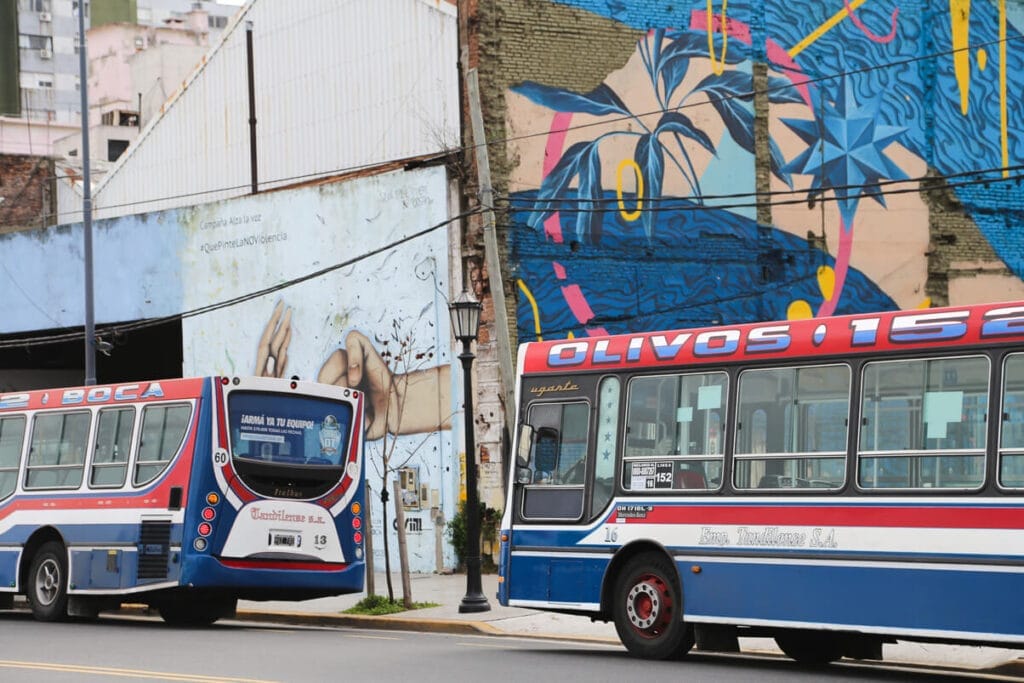
Bondi
Bondi is the Argentine word for bus.
- “Voy a tomar el bondi” – “I’m going to take the bus.”
Where bondi came from is uncertain but it’s so commonplace that when Argentina’s first low cost airline was founded they used it in their name – Flybondi – to represent their goal to make air travel more accessible for the everyday Argentine.
Atorrante
Someone who is an atorrante in Argentina is lazy, avoids work, or is a free loader.
While yes, it can be used in a serious way, it’s also often used with a lighter, cheeky tone. Like when my mother-in-law talks about my cat. And she’s right, atorrante is an accurate description of most cats.
Laburo
Most of the Spanish speaking world uses the words trabajar (to work) and trabajo (job/work).
Argentine slang, however, uses laburar.
This is yet another word borrowed from Italian – lavorare is the Italian word for work.
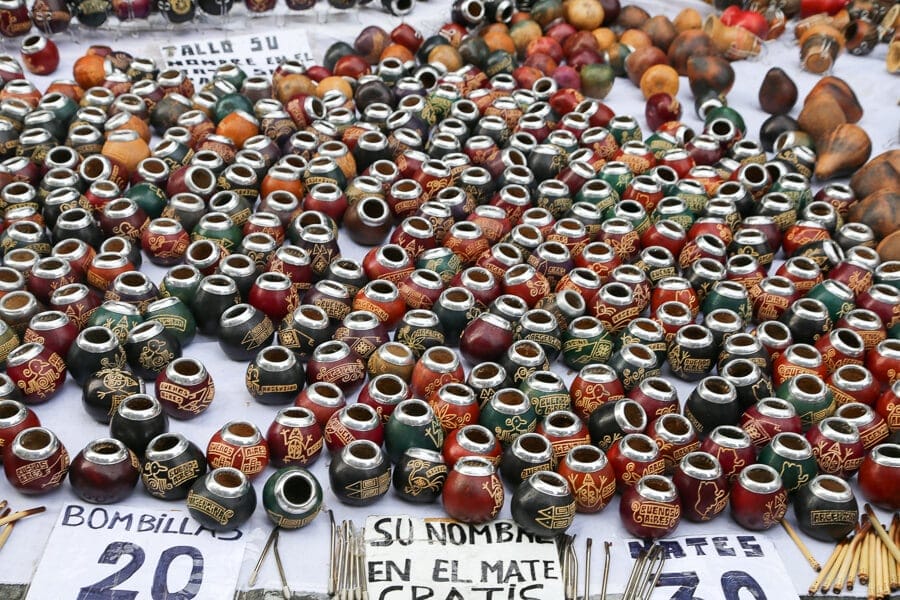
Chorro
A chorro in Argentina is a thief.
A moto-chorro is a thief atop a motorcycle who will drive by and snatch your bag or phone.
Chorizo is a silly way to say thief, a play on words with the popular sausage. “Es un chorizo.” – He’s a thief.
A choreo is an act of thievery.. It can be a literal robbery or it to describe a scam or just to complain about high prices. – “Es un choreo!”
Another word for chorro is afanar or afano.
- “El chorro me afanó la billetera.” – A chorro/afanar supercombo meaning “The thief stole my wallet.”
On the other end of the spectrum, there are just as many (if not more) Argentine slang words for police: yuta, cana, botón, tira, and cobani.
With so many words for thief and police, are you worried about safety in Argentina? It’s fine, I promise. Read my article about safety in Buenos Aires for tourists to put your mind at ease.
Tener Fiaca
Tener fiaca is slang for to feel lazy.
Feeling sluggish? Do you want to lounge in bed and binge Netflix all day and cancel your plans? You can say – Tengo fiaca.
It can also be attributed to a task you really don’t want do or a place you really don’t want to go. – Ir a la fiesta me da fiaca. As if the mere idea of the party gives you laziness.
Fiaca is yet another gift to lunfardo from Italia. Fiacco is Italian for tired or worn out.
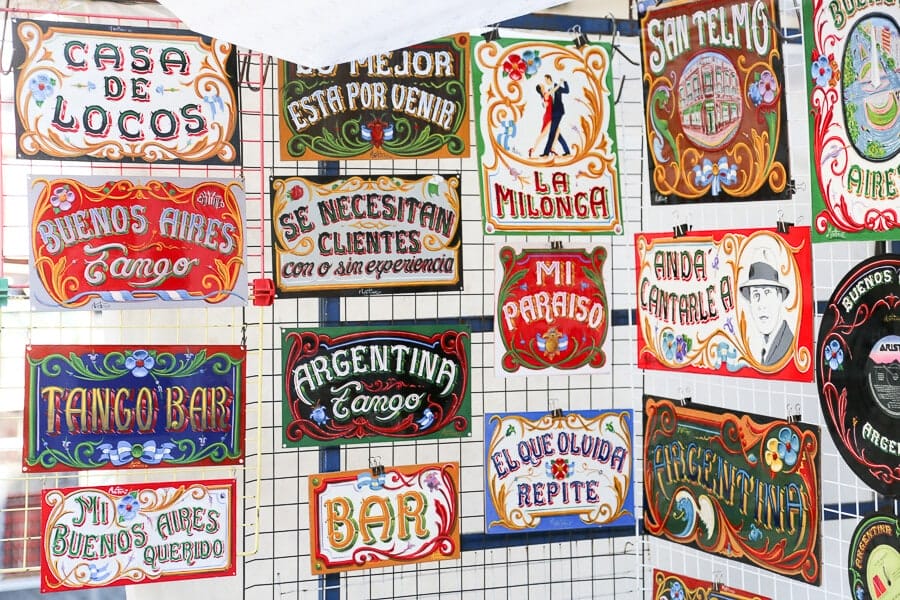
Tener Facha
In Argentina, tener facha means to look good. And in such an attractive country, honestly, it’s a helpful term to have in your back pocket.
“Che, que facha que tenés en esa remera.” means “Man, you look so great in that t-shirt!”
“Cuanta facha!” you could exclaim when you see someone who looks particularly good.
You can also use it in the form of fachero or fachera. “Ese pibe es re fachero.” – “That guy is really good-looking.”
Zafar
Zafar is similar to the English phrase “by the skin of my teeth,” or to just barely get out of trouble or get away with something.
I find myself saying “zafamos, eh?” all the time in the vein of “uff, we sure got lucky.”
It can also be used in the reflexive, zafarse de algo. “Ayer me intentaron robar, pero me zafé.” would be “Yesterday, they tried to rob me, but I managed to escape.”

Resources for Learning Argentine Spanish
- Che, Boludo – The book to get if you want a complete dictionary for Argentine Slang
- Spanish Crash Course – In Argentina with limited time? This one day crash course will give you the basics you need for your trip, a truly fun way to learn the basics with a small group in person.
- In Person Classes – This week-long pack of classes is a great option to get started learning Spanish in Buenos Aires.
- Learn Online – Want to brush up on your Spanish before you arrive? Take lessons online with local teachers, it will make a difference to have practiced Argentine Spanish in particular.
Read More about Argentina
- When to visit Argentina: Best Time of Year
- What to pack for Argentina
- 7 Sample Argentina Itineraries
- The Best Things to do in Buenos Aires
- Buenos Aires Food Tours
Argentina Travel Resources
- BOOK A CONSULTATION | I offer one-on-one travel consultations to help you plan your trip to Argentina. Pick my brain to get a local’s insight. Click here for more information.
- MY MAP | Buy my interactive map with 300+ pins to have access to the city as I see it. It is an invaluable resource. See more here about how it works.
- AIRPORT TRANSFERS | Having a driver waiting for you is ideal for a stress free arrival, Cesar and his team here is the best option for a driver from Ezeiza or Aeroparque, they are my go-to airport ride!
- TRAVEL INSURANCE | Always travel insured. Anything can happen anywhere and it is scarier and costlier in an unfamiliar country. SafetyWing’s Essential Plan covers unexpected travel and medical emergencies and even offers add-ons like electronics theft or adventure sports. It is the best if you’re coming on vacation. If you’re coming as a digital nomad or an extended stay, you need their Complete Nomad Plan which also covers routine check ups, maternity, mental healthcare and more. Read more: Health Insurance in Argentina
- PHONE PLAN | These days, traveling with data is essential. Especially in Argentina where everything is managed on Instagram and WhatsApp. I recommend this E-SIM card. It’s hassle-free and affordable, for more read how to get an Argentina sim card.
- ACCOMMODATION IN ARGENTINA | booking.com is the most common hotel site used in Argentina and it’s where you’ll find the most options.
- RENTAL CARS | I love using Discover Cars, it is a great platform to compare different rates and providers and I find they have responsive customer service.
- BUS TICKETS | Check Busbud for long distance bus routes and tickets.
- VPN | If you’ll be using a public WiFi connection and want to secure your data, I highly recommend using a VPN, I personally use and have had a good experience with ExpressVPN. I also use it to access Hulu and American Netflix from Argentina.
- FLIGHTS | Always check Google Flights and Skyscanner for flights to and within Argentina. Aerolineas Argentina is the local airline with the most routes. FlyBondi and Jetsmart are two budget airlines with dirt-cheap prices (but expect to pay for every add-on like luggage).


I have been living in Granada, Spain for two years now, so I’d say I speak more or less fluently. However so many of these words are different. It would be interesting to see how a trip to Argentina would go for me.
Thank you for sharing this. I have been fascinated with everything Spanish – I am just about to sign up for Salsa lessons too!With traveling my interest in Spanish / Hispanic cultures grew. I listen to a lot of Spanish music – I can sing even tho I don’t understand what they are saying (lol) I am slowly and steadily learning the language too
Re bueno,che!! 😀 Haha. No, seriously, I really enjoyed your post! I think you captured really great some of the most important words and phrases in Lunfardo! 🙂
Thanks for sharing your wisdom 😉
That was possible to learn so many language and song. This man is so intelligent. I enjoy this this post and learn many think. Thanks for sharing this information.
I know! And the Spanish in Granada is really hard as well! But sooooo different, I studied abroad in Granada and I remember going back to school in Texas and everyone who had gone to Mexico had no idea what I was saying hahah
Gracias che!!!
I am an American of mixed nationality. I was born in Cordoba and raised in Tucuman so my Spanish is definitely norteno. The rr sound up north is very different from the rest of the country. Most people can’t make the sound unless they’re born there. I can’t roll my rr because they don’t roll it in the North. I then moved to northern Mexico and I swear I couldn’t understand anything for a couple of months. I learned the Mexican dialect and eventually moved to the USA where I ran into the rest of the dialects.
It’s so true that the different regions of Argentina have very different accents (all very different than that of Mexico!). I love the Cordoba accent (and sense of humor!) and the Northern way of pronouncing the r.
Hi Erin,
I took Spanish in High School and College…but that is about it. Will I have a hard time getting around and communicating with people?
Love your blog! Thanks!
You should be absolutely fine, between your broken Spanish and the locals broken English you’ll get by 🙂
As a teenager, I lived for 3 years in the suburbs of Buenos Aires. A frequent source of hilarity was when any newly arrived American kid my age, who believed that they learned to speak Spanish well in their schools in America, and then discovered that there were important differences in the local vocabulary.
It has been 50 years, but I still remember one such incident vividly.
There was a tiny cafe near my school, where many teens would hang out after class. It was named “La Zapateria”.
One year, at the start of term we met a new kid who had just transferred from the States. After school he tried to make friends with us and hang with us.
One of our gang decided to check if he could really understand the local dialect, and told him: “¡Che Pibe! Vamos a comer a La Zapateria. ¿Vos tenes hombre? ¿Que gustas?”
He knew he was being tested, but he still was cocky, because he thought his Spanish was very good. So, he (over)confidently responded with a query about take out food:
“Me encanto mucho a los tacos. ¿Puedo comprar algunos tacos en “La Zapatería” que puedo coger a casa después?
Needless to say, tacos (the Mexican food) were not on the menu at cafes in Buenos Aires. But, “tacos” might refer to “heels” at a shoe store. Sadly, the verb Coger wasn’t used to mean “to take or pick up” in Buenos Aires either.
It seemed like he was confessing to a weird sexual fetish…
Teenage boys can be brutal in tormenting a new kid. The story was all over school the next day, and I don’t think anyone ever let him forget his faux pas.
Perhaps the purpose of some people’s lives is to be a warning to others. Thankfully that episode was so memorable that I won’t be making that mistake in my life!
¡Ojo, eh!
Aww kids can be so cruel!
A few other words:
Bondi—bus
Laburo—job or work
Laburante—hard-working person (the word trabajador is mostly linked to Peronism)
Rajar—leave in a hurry
Disparar—leave in a hurry
Grasa—tacky
Ñoquis refer to los ñoquis del 29, that eaten once a month in the hopes of getting money in the future.
I would argue that the word for skirt is pollera, not falda (except for minifalda). The term pendejo is considered vulgar. It can also mean pubic hair, so use with caution.
“Lompa “if you say pantalón pantalón pantalón then the end of the word becomes the start “Lon” and the beginning the end ..
Panta lompa ntalon …
I hope that makes sense lol
OMG does this bring me back to my childhood as my parents and godparents would sit around the table with the rueda de mate going on. They had all moved from Bs. As. to NY in 1961 and I was born there soon after. Majoring in Spanish in college it was a joy to have a professor from Bs. As. so I could speak as I learned. This blog brought back many words I normally don’t hear in speaking with others.
My only suggestion would be that, instead of the “sh” sound for the “ll”, it is a little softer, more like a “zh”. I actually take pride in pronouncing all my “ll”’s and “y”’s with the “zh” sounds whenever I speak with anyone.
Thank you for this blog. It literally put a smile on my face to remember all of this!
I love the accent here but when I go home to Texas everyone thinks I speak Italian hahah it’s very different, so lucky you got a Porteno professor